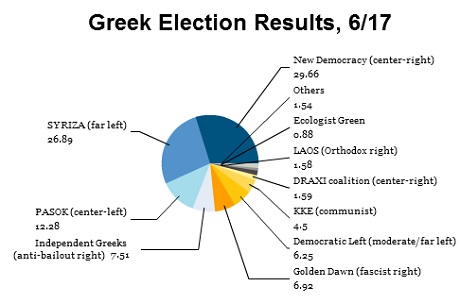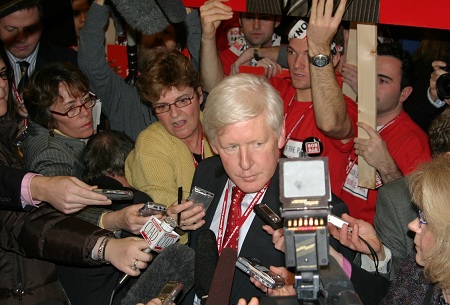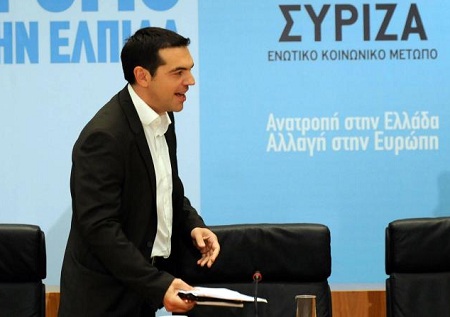With just over 50% of results in, it appears that New Democracy will win today’s election in Greece.
If the results (set forth below) remain consistent as votes are counted, it will mark a result fairly consistent with the result in the May election, with more voters, however, shifting to the two main contestants — New Democracy and SYRIZA definitely have shaved off votes from the other parties.
PASOK will have done a little worse, having been crushed by the pro-bailout New Democracy from its right and by SYRIZA’s stridently anti-bailout position to its left, but will likely join a coalition with New Democracy.
I wonder if New Democracy’s alliance in the second round with the Democratic Alliance will have made a crucial difference — a small centrist/liberal party founded by a former member of New Democracy (Dora Bakoyannis), who was expelled from New Democracy in 2010. The party won just around 2.5% in the first round of the election, and the formal alliance this time around may well mark the difference between New Democracy and SYRIZA.
It will be a disappointment for the mainstream parties that Golden Dawn appears to have done no worse or no better from the first round — the mainstream parties will now have to find a way to live with a blatantly neo-fascist party in the Hellenic parliament and to confront the reasons why 7% of the Greek electorate emphatically support a party that has espoused neo-nazi views.
Outside of Greece, New Democracy’s win will likely be taken by the European Union and the international community as a good sign — a sign that Greece is fully committed to remaining in the eurozone and to the austerity program that is a condition of the country’s two bailouts. But it remains nearly certain that Antonis Samaras, the leader of New Democracy and likely Greece’s next prime minister, will engage in negotiations with the European Commission, the European Central Bank and the International Monetary Fund to ease the austerity in Greece or to achieve some sort of aid package to help get Greece’s economy growing again.
While New Democracy’s election won’t necessarily prevent Greece’s exit from the eurozone, it does not seem likely that Monday will mark a “Lehman” moment, where doubts about Greece could spur a bank run throughout the troubled economies of the European Union, as could have been the case in the event of a SYRIZA win.
And for SYRIZA itself? We have not seen the last of its brash, young leader in Alexis Tsipras, who will now be the main opposition figure. In doing so well in the May election, Tsipras forced the two main parties, but especially New Democracy, into acknowledging the real pain that austerity has inflicted throughout Greek civil society and moving toward SYRIZA’s position that the terms of the bailout must be renegotiated. In opposition, Tsipras will have no responsibility for the difficult decisions that Greece’s new government will inevitably have to take, and he will have an opportunity to enshrine SYRIZA more permanently as the mainstream leftist party in Greece — perhaps with a merger of the Democratic Left (a slightly more moderate party that itself split in 2010 from SYRIZA), and by continuing to poach away voter support from PASOK and from the KKE (the Communists).
The first key will be to see what post Evangelos Venizelos, PASOK’s leader, receives in an New Democracy-PASOK government — it seems very likely that the one-time finance minister, much respected in that role throughout the past year, will now once again be finance minister. If so, however, he will struggle in his role as PASOK’s leader to define PASOK’s ongoing role in Greek politics, especially with SYRIZA resurgent on its left. As the minor partner in a conservative, pro-austerity government, Greece’s longtime socialist party seems to have a precarious future.
* * * *
New Democracy (center-right party): 30.24% with a projected 130 seats.
SYRIZA (radical left anti-bailout party): 26.30%with 70 seats.
PASOK (traditional party of Greece’s left, but “pro-bailout” party): 12.69% with 34 seats.
Independent Greeks (anti-bailout right-wing party): 7.45% with 20 seats.
Golden Dawn (neo-fascist party): 6.94% with 18 seats.
Democratic Left (another leftist anti-bailout party): 6.07% with 16 seats.
KKE (Greece’s communist party): 4.43% with 12 seats.
![]()







